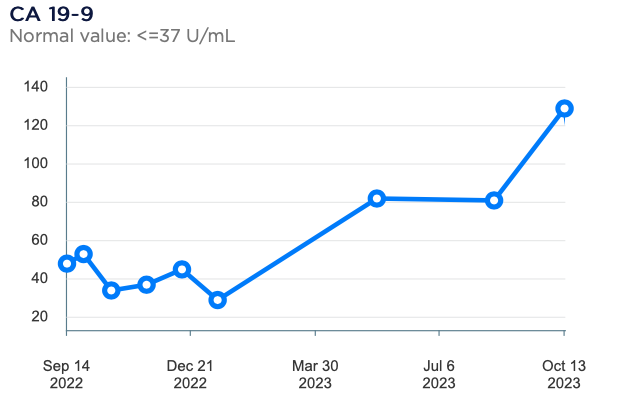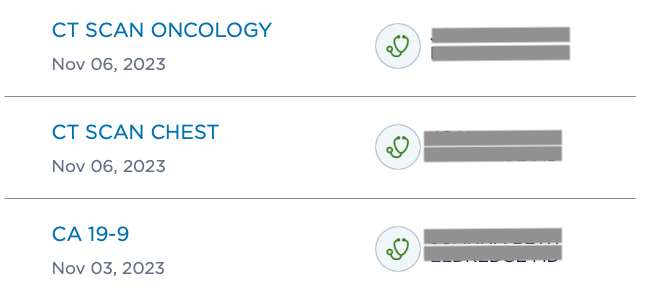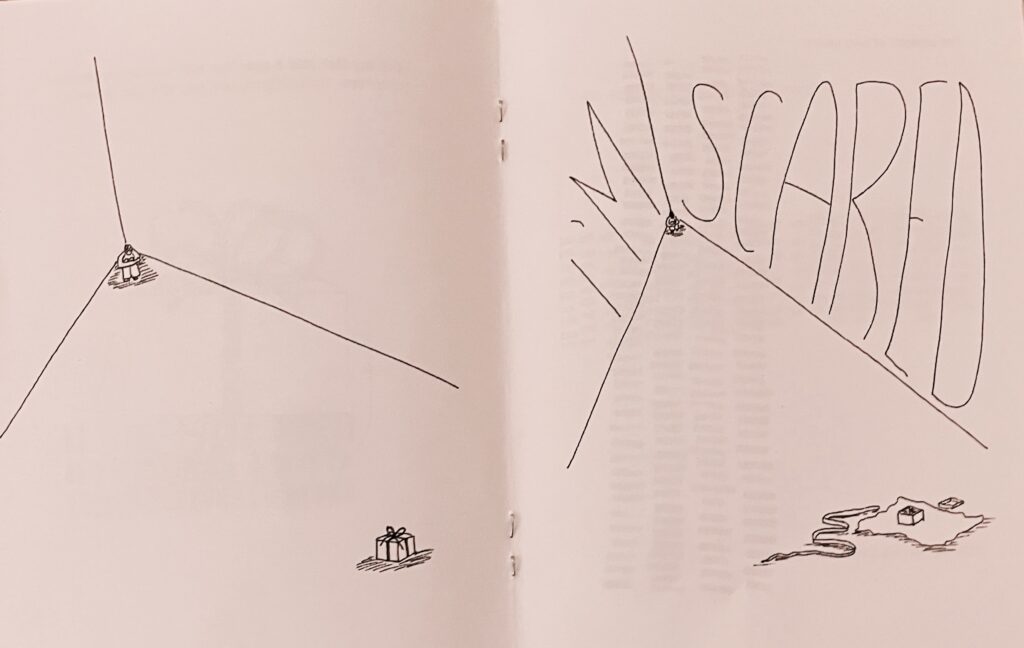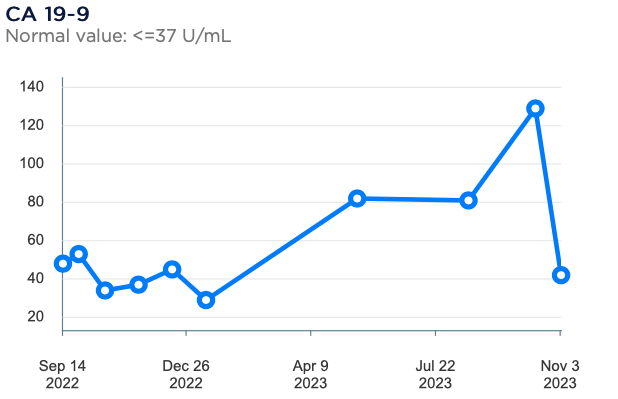One of the biggest struggles during this cancer ordeal has been my relationship with faith. Not faith in a higher power. But faith in my doctors.
It’s been especially challenging since my surgery nine months ago. I am in “surveillance” mode now. Every three months, I get a CT scan that looks for visual evidence of tumors, and a blood test that looks for evidence of CA19, a protein that can indicate whether my body is developing new tumors. Together, they tell the story of what’s happening inside.
With my tests in May, the first after my surgery, my CT scan was clear, but my tumor marker number was higher than normal. Not super high as with some cancer patients. But higher than it had been even at my sickest.
Wait. What? Why?
My oncologist said not to worry. The CT scan is the most important test (true), and there are good reasons why the CA19 might be high so soon after surgery. Three months later, same result: an above-normal CA19 number, but clean CT scan. Grrr. Now the CA19 is giving me fits. Is it picking up something that the CT scan can’t see?
My oncologist says, again, not to worry. We are looking for trends, up or down. Stasis is OK. Hmm. Dr. Google says one thing, she says another. Who to believe? For the sake of my mental health, I tuck it in the back of my mind and don’t think about it (and pat my neurotic self on the back for my maturity).
Fast forward to last month. This time the number has shot up even higher, and it’s caught the attention of my oncologist. In a late-night message, she doesn’t sugarcoat anything. She’s concerned enough that she orders a second CA19 test and moves up my scheduled CT scan.

Even with the reschedule, I am forced to wait two weeks for the tests. Two weeks of sleep-deprived nights and the encroaching worry about mortality—again. I seek relief in morning meditation and try to keep everything in perspective. We don’t know what we don’t know.
But I’m angry. Why did my doctor dismiss the first two CA19 results? Now her indifference is coming home to roost. Something is growing inside, I tell myself, and we should’ve caught it earlier.
I keep this development to myself. No need to draw attention or worry anyone else. I even decide that if the worst comes to pass and I go back for treatment, I won’t tell anyone right away.
On the morning of November 6, I go in for my scan on just one hour of sleep. I’m tired and hungry, which helps suppress my anxiety. As I lie prone staring at the Nemo decals on the ceiling, they drape my body in a heated blanket, inject the contrast dye into my left arm and slide me into the loud, whirring cylinder. The familiar disembodied voice tells me when I can and cannot breathe. It’s a reminder that, for now, I’m still a cancer patient.
The test results come back almost right away. I stare for a long time at my patient portal, afraid to click open…

A friend recently gave me a packet of five little booklets that she picked up from a cancer survivor in Joshua Tree. Jillian’s booklets are about being NERD, a medical acronym for “no evidence of recurrent disease.”
Being NERD, which I am, is a good thing.
It also means carrying around worry of becoming not NERD should the nasty cancer cells come back.
As Jillian writes, being in surveillance mode “means measuring one’s life into three-month or six-month blocks.”
For about two weeks approaching my quarterly tests, generalized anxiety takes hold. I don’t talk about the background worry because of my foolish attachment to stoicism, and because…what’s the point? There’s nothing anyone can say to relieve the anxiety. It comes with the territory—and will for the next five years.
Outwardly, we say what we think people want to hear and what we want to believe about ourselves: that anxiety and uncertainty helps us appreciate life and live in the present.
But a lot of times, Jillian writes, the actual reality is:
“I put my fear into a neat box so no one, including myself, has to touch or feel it.”
Until it doesn’t hold…

I finally open the test results.
First the CA19 level. It’s dropped dramatically almost down to normal. Wow.

Now the scans:
Overall stable appearance of the chest. No evidence for metastatic disease. Overall stable appearance of the abdomen and pelvis. No evidence for recurrent or metastatic disease.
Relief washes over me. I exhale for the first time in two weeks. I want to flee the office, go to the beach, watch the waves and deeply breathe in the salty sea air.
“I am grateful for being NERD,” Jillian writes. “Most days, I accept the uncertainty and find it clarifying. It really does help me appreciate life and be in the present. And some days, I’m scared, which is clarifying in its own way.”
So, what did I learn about faith in my doctor? This time, everything turned out OK. My trust is renewed. But what if it hadn’t worked out? Would I resent her for not taking action when those first alarm bells went off in my head?
I can’t worry about the what-ifs or dwell in negativity. I’d drive myself crazy. I’m determined to live life as worry-free as possible and refuse to let the specter of cancer paralyze me with fear.
Again, I turn to joy and daily gratitude for being here, alive and healthy. All I can do is put one step in front of the other, remember to breathe, and have faith that my body and my doctors—and maybe even a higher power—will look out for me.
[PS: The CA19 number is a blessing and a curse. It can point to problems. But so many things can drive it up and down that it sometimes ceases to be useful and provokes unwarranted anxiety. In my case, my oncologist says “it’s anyone’s guess” as to why it jumped around. I resolve not to put too much weight on it in the future.]
